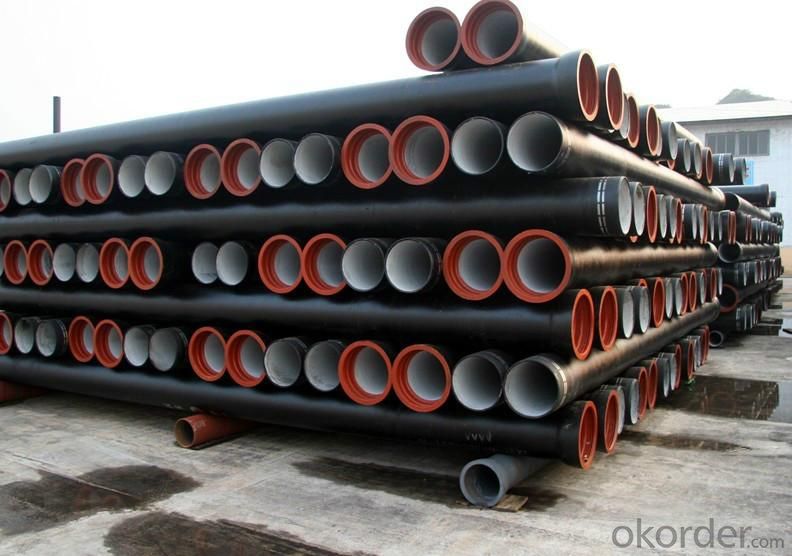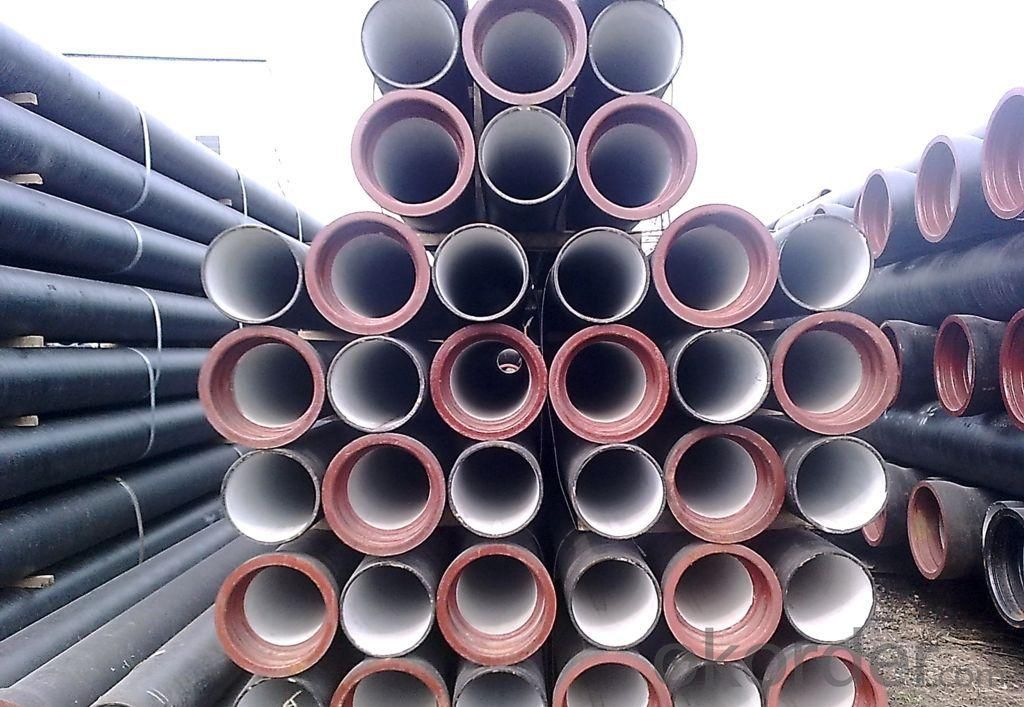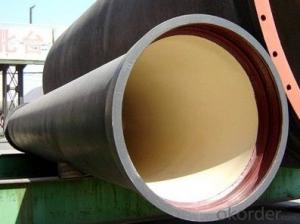Ductile Iron Pipe DN80-DN400 EN545/EN598/ISO2531 For Waste Water
- Loading Port:
- China main port
- Payment Terms:
- TT or LC
- Min Order Qty:
- 28 m.t.
- Supply Capability:
- 200000 m.t./month
OKorder Service Pledge
OKorder Financial Service
You Might Also Like
1,Ductile Iron Pipe Description :
1) Pipes confirm to ISO2531,K9 class,T type joint,6m long,with inside cements lining conform to ISO4179, outside Zinc spraying(130g/m2) and bitumen coating(70μm) conform to ISO8179.
2) Pipe ends: Spigot and socket ends, with 100% SBR rubber gaskets accoding to ISO4633
3) we can do third party inspection according to customer's request.
2,Main Features of the Ductile Iron Pipe:
1).Quality guarantee
• Chemical checking
• NDE after rough machining
• Mechanical testing after heat treatment
• Final NDE,dimension inspected
2).Quality document
• Full Q.A document as per client request
3).Packing and Shipping
• standard export package(carton/wooden case/pallet)
• accept FOB,FAS,CNF,CIF door to door etc or customer designated shipping agent
4)Inspection
• In-house Foundry
• Third party inspection available upon requirement
3,Ductile Iron Pipe Images:


4. Ductile Iron Pipe Specification:
Internal lining: ductile iron pipes shall have an internal cement mortar lining in acc with ISO4179.
External coating: ductile iron pipes shall be externally coated with metallic zinc spray plus a further layer of resin painting to ISO8179.
Gasket: 100% SBR/NBR/EPDM rubber gasket in accordance with ISO4633.
Packing: ductile iron pipes from DN100 to DN300 be bundled with steel belts, others are in bulk.
Payment term: L/C, T/T.
5.FAQ:
We have organized several common questions for our clients,may help you sincerely:
1.Q: Why would you choose ductile iron pipe rather than other pipe materials?
A:The reasons are obvious for that not only ductile iron pipe possesses the inherent strength and flexibility of ductile iron, combined with proven corrosion protection systems, but also the cost savings can be achieved from design to installation and commissioning.
2.Q:Why can you guarantee the inner of pipes can’t be corroded?
A: High alumina cement mortar lining and sulphate-resistant cement mortar lining. These two special linings are applicable to inner anti-corrosion for sewage pipes, improving resistance to erosion of the sewage components.
- Q:Are ductile iron pipes suitable for potable water distribution systems?
- Yes, ductile iron pipes are suitable for potable water distribution systems. Ductile iron pipes have excellent corrosion resistance, high strength, and durability, making them a reliable choice for transporting drinking water. They are also widely used in water infrastructure due to their ability to withstand high pressures and external loads.
- Q:How do ductile iron pipes handle dynamic loads?
- Ductile iron pipes are known for their exceptional strength and durability, which allows them to effectively handle dynamic loads. These pipes have a high resistance to bending and can withstand the pressure and stress exerted on them when subjected to dynamic loads, such as water hammer or ground movement. The unique composition of ductile iron, which includes a small amount of carbon and the addition of magnesium, creates a structure that is both strong and flexible. This combination enables the pipes to flex under the impact of dynamic loads, rather than fracturing or breaking like other materials. Additionally, ductile iron pipes have a high impact resistance, which means they can absorb and distribute the energy generated by dynamic loads throughout their structure. This ability to dissipate energy helps to minimize the risk of pipe failure and ensures the longevity of the pipeline system. Furthermore, ductile iron pipes have excellent stress distribution properties, which means that the load applied to the pipes is evenly dispersed along their length. This helps to prevent localized stress concentrations and reduces the likelihood of damage or failure. In summary, ductile iron pipes are designed to handle dynamic loads efficiently. Their strength, flexibility, impact resistance, and stress distribution properties make them highly suitable for applications where dynamic loads are a concern, ensuring the reliability and longevity of the pipeline system.
- Q:What is the expected surge pressure rating of ductile iron pipes?
- The expected surge pressure rating of ductile iron pipes can vary depending on factors such as pipe diameter, wall thickness, and application. However, generally speaking, ductile iron pipes have a surge pressure rating that ranges from 350 psi to 500 psi.
- Q:How does ductile iron pipe handle changes in pipe diameter or size?
- Ductile iron pipe offers a convenient solution for dealing with alterations in pipe diameter or size. Its excellent flexibility and capacity to adapt to changes in pipe dimensions without compromising its structural integrity are a result of its unique composition, which contains a significant amount of graphite nodules that provide ductility and elasticity to the material. When faced with adjustments in pipe diameter or size, ductile iron pipe can be easily manufactured or modified to meet specific requirements. It can be cast or fabricated in different diameters and lengths, allowing for seamless integration and adaptability within a pipeline system. This versatility proves particularly advantageous when connecting different pipe sizes or making alterations to the pipeline layout. Furthermore, the superior mechanical properties of ductile iron pipe enable it to withstand the stresses and forces associated with changes in pipe diameter or size. It possesses high tensile strength, impact resistance, and durability, ensuring its ability to handle the internal and external pressures exerted on the pipe during operations. Moreover, the jointing systems employed with ductile iron pipe contribute to its ability to handle changes in diameter or size. Various joint types, including push-on, restrained, or mechanical joints, provide secure and leak-free connections between different pipe sections. These joints facilitate easy assembly and disassembly, enabling efficient adjustments to the pipe diameter or size as required. In conclusion, ductile iron pipe is well-equipped to handle changes in pipe diameter or size due to its inherent flexibility, adaptability, and robustness. Its composition, manufacturing capabilities, and jointing systems all contribute to its capacity to accommodate variations in pipe dimensions without compromising its performance.
- Q:Can ductile iron pipes be used for water supply in remote areas?
- Yes, ductile iron pipes can be used for water supply in remote areas. Ductile iron pipes are known for their strength and durability, making them suitable for various applications, including water supply systems. Their resistance to corrosion and ability to withstand high pressure make them a reliable choice for transporting water even in remote areas where maintenance and accessibility may be challenging.
- Q:Are ductile iron pipes suitable for landfill leachate collection?
- Ductile iron pipes are indeed appropriate for collecting landfill leachate due to their excellent corrosion resistance, which is essential when dealing with corrosive substances present in the leachate. Additionally, these pipes possess remarkable strength and durability, enabling them to endure the pressure and stress exerted by the leachate collection system. Moreover, their ease of installation and maintenance is well-known, rendering them a pragmatic option for landfill leachate collection systems. In conclusion, ductile iron pipes possess the requisite properties and traits to efficiently and effectively gather landfill leachate.
- Q:Can ductile iron pipes be used for irrigation pivot systems?
- Yes, ductile iron pipes can be used for irrigation pivot systems. Ductile iron pipes have high tensile strength and durability, making them suitable for handling the pressure and load requirements of irrigation pivot systems. Additionally, their corrosion resistance makes them a reliable choice for long-term use in such applications.
- Q:What is the relationship between continuous cast iron pipe and ductile iron pipe?
- In general, the continuous cast iron pipe is the continuous casting of gray cast iron pipe, while the centrifugal cast iron pipe is centrifugal ductile iron pipe. Of course, you have to be hard, just to make continuous ductile iron pipes, that's what you want.
- Q:Are ductile iron pipes suitable for use in geothermal applications?
- Geothermal applications can benefit from the use of ductile iron pipes. These pipes possess qualities such as strength, durability, and corrosion resistance, which are crucial for geothermal systems. In the realm of geothermal systems, which involve utilizing the Earth's heat for energy generation or building heating and cooling, ductile iron pipes are well-regarded. They are capable of enduring high temperatures and pressures without compromising their structural integrity. This ability to withstand thermal expansion and contraction ensures a dependable and long-lasting piping solution. Moreover, ductile iron pipes exhibit exceptional resistance to corrosion, making them ideal for the potentially corrosive environment often encountered in geothermal applications. This resistance guarantees that the pipes will not deteriorate over time, thus maintaining the system's integrity and minimizing the risk of leaks or failures. Additionally, ductile iron pipes possess a smooth interior surface, which aids in reducing pressure loss and energy consumption in geothermal systems. The smoothness of these pipes also lowers the likelihood of mineral deposits or scaling buildup, promoting efficient and uninterrupted heat transfer. All in all, ductile iron pipes prove to be a suitable choice for geothermal applications due to their strength, durability, corrosion resistance, thermal stability, and smooth interior surface. They offer a reliable and efficient piping solution capable of withstanding the demanding conditions of geothermal systems while ensuring long-term performance and minimal maintenance requirements.
- Q:What is the lifespan of ductile iron pipe?
- Various factors, such as pipe quality, installation environment, and maintenance practices, can influence the lifespan of ductile iron pipe. On average, this type of pipe typically lasts between 80 and 100 years. This impressive longevity can be attributed to the inherent durability and strength of ductile iron, enabling it to withstand high pressure, external loads, and environmental conditions. Moreover, ductile iron pipe is often coated with protective linings, such as cement mortar or epoxy, to enhance its resistance to corrosion and extend its lifespan. Regular inspections and maintenance also play a crucial role in prolonging the life of ductile iron pipe by promptly identifying and addressing potential issues. Ultimately, with proper installation, maintenance, and care, ductile iron pipe can provide a reliable and long-lasting service for several decades.
1. Manufacturer Overview |
|
|---|---|
| Location | |
| Year Established | |
| Annual Output Value | |
| Main Markets | |
| Company Certifications | |
2. Manufacturer Certificates |
|
|---|---|
| a) Certification Name | |
| Range | |
| Reference | |
| Validity Period | |
3. Manufacturer Capability |
|
|---|---|
| a)Trade Capacity | |
| Nearest Port | |
| Export Percentage | |
| No.of Employees in Trade Department | |
| Language Spoken: | |
| b)Factory Information | |
| Factory Size: | |
| No. of Production Lines | |
| Contract Manufacturing | |
| Product Price Range | |
Send your message to us
Ductile Iron Pipe DN80-DN400 EN545/EN598/ISO2531 For Waste Water
- Loading Port:
- China main port
- Payment Terms:
- TT or LC
- Min Order Qty:
- 28 m.t.
- Supply Capability:
- 200000 m.t./month
OKorder Service Pledge
OKorder Financial Service
Similar products
New products
Hot products
Related keywords



























